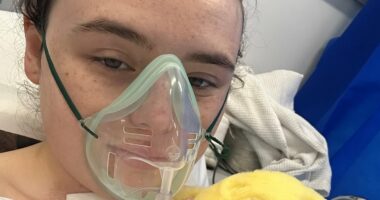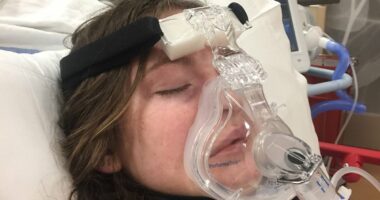Share this @internewscast.com
This winter, discerning between Covid-19 and the flu could be as straightforward as recognizing a specific type of cough, according to guidance from the NHS. As the chillier months settle in, certain illnesses are known to make a reappearance.
With the onset of winter, ailments such as the common cold, respiratory syncytial virus (RSV), Covid-19, and influenza tend to rear their heads more frequently. The colder climate provides a conducive environment for these viruses to thrive, while increased time spent indoors in close proximity to others facilitates their spread.
Despite this pattern, distinguishing between these illnesses can be challenging due to their similar symptoms. Overlapping signs often blur the lines, making it difficult to pinpoint the exact cause of one’s discomfort.
For instance, both Covid-19 and the flu share several symptoms, as outlined on the NHS website. These include:
However, due to some of their overlapping symptoms, it can be hard to know exactly what is wrong.
For example, the NHS website lists the following as both signs of Covid and flu:
- A high temperature
- A sore throat
- Feeling tired or exhausted
- A headache
- Diarrhoea
- Feeling sick or being sick
- A loss of appetite
Both illnesses can also cause a cough. But this is where you might be able to distinguish one from another.
If you have the flu, the NHS says you might experience a “dry” cough. This could “come on very quickly”.
In comparison, with Covid you could have a “new, continuous cough”. The NHS explains: “This means coughing a lot for more than an hour, or three or more coughing episodes in 24 hours.”
Find out about the symptoms you need to watch out for and get health advice with our free health newsletter from the Daily Express
This advice is backed by Doctor Rupa Parmar, a GP and medical director at Midland Health. Speaking previously to The Mirror, she said: “With a cold, a cough will be mild, while a flu cough will seem dry.
“With Covid, a cough will be dry and continuous, and many people will cough for more than an hour or have three or more coughing episodes within a day.”
Other ways to distinguish between Covid and flu
It is not just the type of cough you have that could help you distinguish between the illnesses. A loss or change to your sense of smell or taste is a commonly reported symptom with Covid.
However, this is less likely to occur with flu. Shortness of breath is also listed by the NHS as a Covid symptom, but not one of flu – although this can occur with flu if it becomes serious.
What to do if you have symptoms
In the case of both Covid and the flu, the NHS advises you to try to stay at home and avoid contact with other people if you or your child have symptoms and either:
- Have a high temperature
- Do not feel well enough to go to work, school, childcare, or do your normal activities
It says: “You can go back to your normal activities when you feel better or do not have a high temperature.” You should ask for an urgent GP appointment or get help from NHS 111 if:
- You’re worried about your or a child’s COVID-19 symptoms or are not sure what to do
- The symptoms are getting worse or are not getting better
- You or a child have other signs of illness, such as a rash, loss of appetite, or feeling weak
- You or a child have a high temperature that last five days or more or does not come down with paracetamol
- A child under three months old and has a temperature of 38C or higher, or you think they have a high temperature
- A child three to six months old and has a temperature of 39C or higher, or you think they have a high temperature
- You or your child have symptoms of flu and you’re 65 or over, you’re pregnant, you have a long-term medical condition, you have a weakened immune system, or your symptoms do not improve after seven days
















